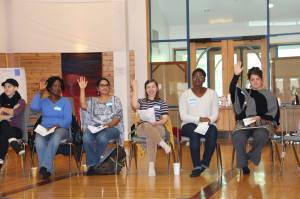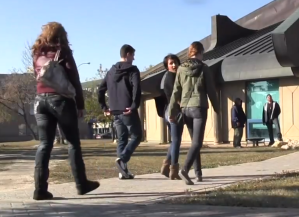By Kirsten Bernas
 There is some good news in the Province’s recently released second annual All Aboard report, which tracks poverty and social exclusion in Manitoba. However, it’s clear that much more needs to be done.
There is some good news in the Province’s recently released second annual All Aboard report, which tracks poverty and social exclusion in Manitoba. However, it’s clear that much more needs to be done.
The report looks at 21 indicators covering areas such as housing, community belonging, education, employment, earnings, poverty rates, income inequality, early learning and childcare, children in care, teen birth rates, and health.
Since the All Aboard poverty reduction and social inclusion strategy was announced in 2009, there has been a 5.3 percent increase in the number of social and affordable housing units supported by the Province, an 8% increase in graduation rates, and a 5.5 percent increase in the availability of licensed childcare.
Despite government efforts, there is still a long way to go. Poverty rates have been on a downward trend over the last decade, but have increased in recent years. The proportion of children in care of the child welfare system has risen by 29 percent. A higher proportion of urban households live in quality, affordable, and appropriate housing now than in years before the strategy, but these gains have been lost in recent years. New immigrants and Aboriginal people are more likely to live in housing that is unaffordable, unsuitable or in poor condition.
Ensuring access to affordable housing is critical to a successful poverty reduction strategy. Efforts to educate, train, and employ low income people are unlikely to be successful if they can’t access safe and stable housing. This basic need improves mental and physical health while providing a foundation from which people can access important social services and participate more fully in the community.
Manitobans who were consulted on All Aboard agree – housing was ranked highest among seven areas where government should invest more to reduce poverty and social exclusion. The Right to Housing coalition has long called for increases in the supply of social housing – where rent is geared to income. Make Poverty History Manitoba represented over 145 organizations that called for an increase to housing benefits for people on social assistance.
The Province has responded with significant commitments. This year, it fulfilled a commitment to deliver 1,500 new units of affordable housing and to support 1,500 households in accessing social housing. By 2016 it promises to build another 500 units each of affordable and social housing.
In addition, Budget 2014 introduced Rent Assist, a housing benefit available to all low income Manitobans to assist with private rental expenses. The Province has committed to increasing Rent Assist’s maximum benefit level to 75 percent of median market rent over a four-year period.
While these important commitments help address the affordable housing crisis, thousands of more units are needed to meet demand. Approximately one in ten Manitoba households live in inadequate housing. The majority of these are unable to access housing that costs less than 30 percent of their household income. Many are forced to rely on food banks as they dip into food budgets to cover shelter costs. Others end up homeless.
Clearly, there is a need for further increases to the supply of social housing. Meanwhile, the ongoing expiration of federal housing subsidies threatens to erode the supply of existing stock. While other levels of government must do their part, we must continue to call on the Province to preserve housing stock while ensuring that additions to supply are net increases and do not come at the expense of other important housing initiatives.
This requires an increase to the housing budget, which was frozen in Budget 2014. The government has found ways to increase spending on the justice and healthcare systems. Many who are incarcerated do not have access to safe and affordable housing at the time of arrest. We know that adequate housing is associated with decreased crime and better health outcomes. The Province would be wise to increase investments in housing to address the underlying factors that contribute to rising justice and healthcare costs.
Community groups will be listening to the upcoming throne speech for the government’s commitment to prioritize funding for housing. They will be expecting an increase to the housing budget in Budget 2015 to meet supply commitments without jeopardizing other important housing initiatives. They will also be expecting a significant investment in Rent Assist to bring the government much closer to meeting its target maximum benefit level of 75% of median market rent, sooner than in four years. This too must be achieved without clawing back other benefits available to low income Manitobans.
This week the Province began community consultations for Budget 2015. Legislation requires the government to take its poverty reduction strategy into account when preparing the budget. Finance Minister Jennifer Howard should heed the call of community groups that are asking the Province to prioritize housing and invest in the necessary foundation for the long-term success of Manitoba’s poverty reduction strategy.
Kirsten Bernas is Research and Policy Manager with the Canadian Community Economic Development Network and Research Affiliate with the CCPA-MB.
A version of this article originally appeared in Winnipeg Free Press, October 27, 2014
Photo: Vianney (Sam) Carriere/flickr
By Mareike Brunelli
 On October 8th, over 60 women gathered at the Circle of Life Thunderbird House on Treaty One territory to share their views on municipal issues and address mayoral candidates. This forum was different than any of the many mayoral forums in the Winnipeg election, and is a model to learn from in future civic engagement efforts.
On October 8th, over 60 women gathered at the Circle of Life Thunderbird House on Treaty One territory to share their views on municipal issues and address mayoral candidates. This forum was different than any of the many mayoral forums in the Winnipeg election, and is a model to learn from in future civic engagement efforts.
By Jim Silver
A wealth of evidence—both global and local—confirms the value of literacy, and the importance of programs that promote literacy. This is especially the case for low-income individuals and communities, for whom gains in literacy can be transformative.
By Kirsten Bernas and Lynne Fernandez

As of October 1st, minimum wage earners in Manitoba will earn $10.70 per hour – just over $20,800 annually. This leaves a family of four, with both parents working, with an income that is more than $1,500 below the poverty line. Single parent families are worse off with incomes more than $8,000 short. It is widely agreed that a job can be the best pathway out of poverty. But this is only true if wages meet basic needs.
University of Manitoba professor Patricia Martens has one more mission as an epidemiologist as she confronts her final days with a terminal disease. She wants the government to stop aiding and abetting the lethal trade in asbestos.
Martens is a prominent and distinguished research scientist in the university’s faculty of medicine. She received the Order of Canada in 2013 for her advancement of population health research and for her contributions to health policy in Manitoba. Her CV is more than 140 pages long, encapsulating a remarkable professional career.
By Molly McCracken
Last night several dozen business leaders, politicians and high profile Winnipeggers spent a night at Portage and Main in the annual CEO Sleep Out to raise funds and awareness about poverty and homelessness. However if we as a society are actually going to end homelessness, systemic change is needed.
While election cycles bring some community challenges to the spotlight, the work creating solutions to these complex challenges is ongoing. Winnipeg’s inner-city neighbourhoods have been quietly transforming — creating employment, reducing poverty, reversing neighbourhood decline and preventing crime.
The Merchants Corner will offer education and housing where a notorious hotel once stood; the Social Enterprise Centre is providing training and jobs to communities while improving housing stock; Neechi Commons is bringing fresh food where no other grocery store stands, along with stable and local jobs.
Community organizations have been the driver of these success stories, but they thrive with supportive governments that move the policy levers and resources at their disposal.
The Province of Manitoba has taken significant steps to work with our communities. The City of Winnipeg has not.
– Excerpt from Winnipeg Free Press Sept. 8th editorial by Kirsten Bernas and Darcy Penner of the Canadian Community Economic Development Network.
View the complete editorial.
Lorrie Steeve’s distasteful comments about Aboriginal panhandlers set off a series of responses that reflected badly on many Winnipeggers. The following week’s big story was the murder of Tina Fontaine and the suicide of Faron Hall. There followed a seemingly unrelated Free Press op ed about climate change, and another breaking story about Manitoba’s and Winnipeg’s credit rating.
The ancestors of 18 prominent Manitobans would all be turned away if they applied today to immigrate to Canada. That was the finding of the first Manitobans to take The Canada Challenge, a quiz that all Canadians were invited to take as they walked through Osborne Village on Canada Day 2014.




Follow us!